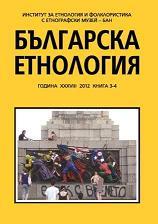Неформалност, джендър, туризъм. Примерът на курорта Боровец
Informality, Gender, Tourism. The case of Borovetz Resort
Author(s): Ana LulevaSubject(s): Anthropology
Published by: Институт за етнология и фолклористика с Етнографски музей при БАН
Summary/Abstract: The functioning of informal practices as part of the labour culture and entrepreneurship in two different economic and political regimes is discussed in the paper in view of the case of Borovetz resort. The attention is focused on the participation of women in the tourist business in the resort and the commented thesis is related to the Bulgarian women working in the sphere of tourism as being among the “winners“ from the transition in contrast to men working in other fields of the economy (Ghodsee 2005: 18). The ethnographic research carried out in the resort in the winter and summer of 2012 and the comparison with previous observations in the same field do not provide evidence in support of such thesis. Viewed in the broad social-economic context, the situation of women employed in the tourism sector does not considerably differ from the satiation of women employed in other spheres. They live and are part of the same gender regime, common gender ideology and culture. The problematic development of the formal economy including the regarded as successful field of tourism compels men as well as women to search for additional income by working in the informal sector (household farm, hourly labour without a contract, self-employment, etc.). Women retain high employment in combining work in the formal and informal economy, however, their situation could hardly be considered as “success“. Those working in hotels, self-employed and employed in family business, evaluate the situation as “coping“, “surviving“ in a long-term and harsh economic situation. In order to overcome the unpredictability of this situation, they use all available resources – their cultural, social and economic capital. Some of the informal practices, known from the socialist time, lose their meaning under the conditions of the new market economy and free access to goods, but others such as party patronage, personal loyalty, buying the access to sources of income gain new power and produce exclusion (of “not our“ people) from the presumably free market and widely accessible formal procedures.
Journal: Българска етнология
- Issue Year: 2012
- Issue No: 3-4
- Page Range: 57-71
- Page Count: 15
- Language: Bulgarian

